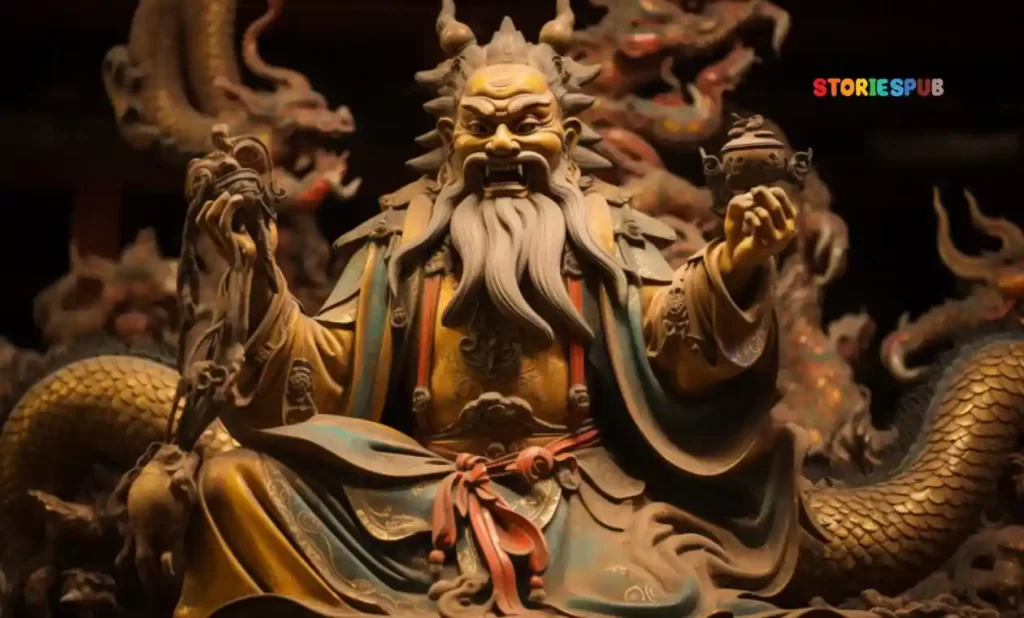Summarize this Article with:
Xuanwu – The God of the North and Element of Water

The Introduction
Chinese mythology is rich with stories of gods and goddesses, demigods, dragons, and other mythical creatures. One such deity is Xuanwu, also known as Xuanwu Da Di.
He is the god of the north and element of water in Chinese mythology. His legend has been passed down through generations, shaping Chinese culture and beliefs.
Xuanwu is considered one of the most important deities in Chinese mythology. He is believed to have a significant impact on people’s lives, especially those who live in northern China.
His role as the god of the north places him at a high position in the pantheon of gods. In addition to being one of the four celestial emblems (the others are the Azure Dragon, Vermilion Bird, and White Tiger), he also symbolizes protection against evil spirits.
As an element deity, Xuanwu represents water which plays a significant role in Chinese culture due to its association with life-giving properties. His connection to water has made him a revered figure that many people look up to for guidance and protection.
Brief overview of Xuanwu’s Legend
According to legend, Xuanwu was born as Liu Bei during the Three Kingdoms period (220-280 AD). He was a prince who later became a general during this era marked by political turmoil in China’s history. Liu Bei came from humble beginnings but managed to rise through ranks until he became one of Emperor Zhuo’s most trusted generals.
During his military career, Liu Bei fought several battles against enemy forces but eventually retired after suffering from an illness that left him blind. Despite his blindness, he was still respected throughout China for his bravery and leadership qualities.
After his death, Liu Bei’s spirit transformed into Xuanwu, the god of the north and element of water. He was given these new responsibilities to help protect China from evil forces, which he did with great success.
Explanation of Xuanwu’s Role as a Deity
Although Xuanwu’s origins were human, he has transcended beyond his mortal status to become a deity in Chinese mythology. As a god, he is responsible for protecting people against evil spirits and serving as an intermediary between the earthly realm and heavens.
Xuanwu is also known for his association with blackness, snakes, and turtles. These symbols have helped define his image as a powerful deity capable of overcoming obstacles that threaten humanity.
His position in the pantheon of gods further solidifies his role as a protector and guide for those seeking spiritual guidance. Xuanwu’s legend has survived through centuries thanks to its significance in Chinese culture and beliefs.
His role as the god of the north and element of water has made him one of the most important deities in Chinese mythology. In later sections, we will discuss Xuanwu’s legend, worship practices linked to him, symbolism associated with this deity among many other interesting topics about this legendary figure in Chinese Mythology.
Origins and Legend
The Story of Xuanwu’s Birth
According to Chinese mythology, Xuanwu was born as a prince named Liu Bowen during the Song Dynasty. His mother was a commoner, and he was often ridiculed by the royal family for his low birth status. However, he possessed exceptional intelligence and soon became a trusted advisor to the emperor.
One day, while meditating in the mountains, Liu Bowen encountered two spirit creatures – a black tortoise and a snake – who recognized his potential for greatness. The two creatures merged with Liu Bowen to form Xuanwu Da Di, the Black Tortoise Divine Emperor.
As Xuanwu, he gained immense power and became revered as a deity throughout China. He is believed to have control over all bodies of water and is associated with strength, protection, wisdom, and longevity.
Legend of His Battle with the Demon Chiyou
One of Xuanwu’s most famous legends is his battle with Chiyou – a demon who threatened to overthrow the heavens. According to legend, Chiyou had an army of fierce warriors who wielded powerful weapons made from magical metals. Xuanwu confronted Chiyou in battle but quickly realized that he was outmatched by Chiyou’s army.
In desperation, he called upon his brother gods – Nuwa (the goddess of creation) and Fuxi (the god of writing) – for help. Together, they created five-colored stones which they used to defeat Chiyou’s army.
But even after their victory against Chiyou’s forces,Xuanwu still had to face him alone . In their final battle,Xuanwu emerged victorious by using his wisdom instead of brute strength.He convinced Chiyou that love rather than power should rule mankind.China celebrates this triumph every year during the Dragon Boat Festival – which commemorates both Xuanwu’s victory and the death of a famous poet who drowned himself in the river after being exiled from his own kingdom.
How He Earned His Place as a Protector Against Evil Forces
As a protector against evil forces, Xuanwu is often depicted wearing armor and holding weapons such as swords or spears. He is also sometimes shown riding on the back of a black turtle or snake – both creatures that are associated with him. In addition to his battle with Chiyou, Xuanwu earned his place as a protector through his many acts of benevolence.
He is said to have saved countless lives by calming storms and floods, healing the sick, and defeating other malevolent spirits. Xuanwu’s influence continues to be felt today throughout China.
Many temples are dedicated to him, and he is revered by both Buddhists and Taoists alike. His image can be found on everything from jewelry to clothing to home decor, while stories of his exploits continue to inspire new generations of believers.
Worship and Festivals
Xuanwu is one of the most revered deities in Chinese mythology, and his worship is deeply ingrained in the country’s culture. He is honored throughout the year in various ways, from visiting temples to participating in festivals dedicated to him.
Overview of Xuanwu’s worship in China, including temples dedicated to him
There are countless temples throughout China that are dedicated to Xuanwu. These temples vary in size and significance, but all share a common purpose: to honor and appease the god of the north.
Many of these temples are located near mountains, rivers or caves that are associated with Xuanwu’s mythology. One example of a temple dedicated to Xuanwu is the Xuanwumen Catholic Church located in Beijing.
Originally built during the Ming Dynasty (1368-1644 AD), it was destroyed during World War II and subsequently rebuilt by Italian Jesuits. The church was built on top of an ancient city gate called “Xuanwumen,” which means “Gate of Black Tortoise.” According to legend, this gate was named after Xuanwu himself.
Another popular temple that honors Xuanwu is Dazhong Temple located in Nanjing. This temple houses a statue of Xuanwu inside its courtyard and features exquisite carvings on its walls that depict scenes from his mythology.
Description of festivals held in his honor, such as the Dragon Boat Festival
One of the most famous festivals honoring Xuanwu is the Dragon Boat Festival. This festival takes place on the fifth day of the fifth lunar month (usually around June) and celebrates his defeat over a powerful demon named Chiyou. During this festival, dragon boat races are held across China as people pay homage to both dragons and water – two elements closely associated with Xuanwu himself.
In addition to the boat races, people also eat rice dumplings called zongzi that are traditionally shaped like triangles or squares and wrapped in bamboo leaves. Other festivals dedicated to Xuanwu include the Xuanwu Festival (also known as the Black Dragon Festival), which takes place on the 18th day of the sixth lunar month.
This festival is celebrated with offerings of food and incense at various temples dedicated to Xuanwu. Overall, Xuanwu’s worship and festivals are an integral part of Chinese culture and a testament to his continued relevance as a powerful god.
Symbolism
Xuanwu is associated with several symbols in Chinese mythology, each of which holds a special significance in Chinese culture and beliefs. These symbols include water, turtles, snakes, and blackness. Understanding these symbols is an important part of understanding Xuanwu’s role as a deity.
Water
Water is a primary symbol associated with Xuanwu. As the god of the north and element of water, he represents fluidity, adaptability, and flexibility.
This symbolism is particularly important in China where water has long been seen as a source of life and prosperity. In Chinese mythology, Xuanwu was said to have control over the waters of the Yangtze River.
This ability made him an essential figure for farmers who relied on the river for irrigation purposes. Because of this association with water control and management, Xuanwu became an important symbol for leadership and authority.
Turtles
Another key symbol associated with Xuanwu is the turtle. In Chinese mythology, turtles are seen as creatures that possess longevity and wisdom – two traits that are also associated with Xuanwu himself.
According to legend, after Xuanwu defeated Chiyou in battle he transformed himself into a turtle to meditate on his victory. It was during this time that he gained spiritual enlightenment and became known as an all-knowing deity who possessed great wisdom.
As such, turtles also represent knowledge or intelligence in Chinese culture. They are often depicted holding scrolls or books in their mouths – another nod to their association with learning and expertise.
Snakes
Snakes are another important symbol associated with Xuanwu. In many depictions he is shown riding atop a giant serpent or surrounded by snakes coiled around his body.
In Chinese mythology snakes are often seen as powerful creatures capable of transformation – something that directly relates to Xuanwu’s story. Additionally, snakes represent fertility and healing, making them an important symbol in Chinese medicine.
Blackness
Xuanwu is also associated with the color black. In Chinese culture, black is often seen as a color that represents power, authority and strength. As the god of the north and element of water, Xuanwu embodies these traits in his role as a protector against evil forces.
His association with blackness further emphasizes his status as a powerful figure who possesses great strength and authority. Xuanwu’s symbolism is multifaceted and deeply rooted in Chinese culture and beliefs.
Each symbol – from water to turtles to snakes to blackness – represents an important aspect of the deity’s character and role in mythology. By understanding these symbols, we can gain a better appreciation for this beloved deity and his place in Chinese culture throughout history.
Legacy
Discussion on Xuanwu’s continued influence in modern times
Xuanwu’s legacy has endured for centuries, and his influence is still felt in modern times. His status as a deity has been passed down through generations and continues to be worshipped by many today.
In China, there are still temples dedicated to Xuanwu, where people go to make offerings and pray for blessings. Additionally, his image continues to be popular in art and literature, as well as being referenced in everyday life.
One of the most significant ways that Xuanwu’s legacy lives on is through the Dragon Boat Festival. This annual celebration takes place on the fifth day of the fifth lunar month and involves racing long boats decorated with dragon heads and tails.
The festival is believed to have originated as a way of commemorating Xuanwu’s heroic deeds, particularly his defeat of the demon Chiyou. Another way that Xuanwu’s influence can be seen in modern times is through various Chinese martial arts practices.
Many martial arts styles incorporate elements of water, which is closely associated with Xuanwu due to his role as the god of the north and element of water. Some practitioners also believe that invoking Xuanwu can help them strengthen their own martial abilities.
Examples of how he has been depicted in art, literature, film, etc.
Xuanwu has been depicted in various forms throughout history, from ancient sculptures to modern-day films. In traditional Chinese art, he is often shown as a fearsome warrior riding a black tortoise or serpent.
He may also be shown holding various objects such as swords or spears. In literature, Xuanwu appears frequently in novels like “Fengshen Yanyi” (“The Investiture of the Gods”) or “Journey to the West.” These stories often portray him as a wise and powerful god who helps mortals in their struggles against evil forces.
Xuanwu has also made appearances in popular culture, particularly in films and television shows. One notable example is the 2006 film “Curse of the Golden Flower,” which features a character based on Xuanwu.
In the movie, his image is used to represent strength and protection against treachery. Overall, Xuanwu’s legacy has endured through time as a symbol of courage, wisdom, and protection.
His influence can be seen in various aspects of Chinese culture, from traditional festivals to modern-day media. While many things have changed since his mythological origins, Xuanwu’s significance remains as strong as ever.
Conclusion
Xuanwu is a deity who has played a significant role in Chinese mythology for centuries. As the god of the north and element of water, he has been revered as a protector against evil forces, particularly those from the north.
His legend involving his battle with the demon Chiyou is just one example of how he earned his place as a beloved deity among Chinese communities. Throughout history, Xuanwu has been worshipped in temples dedicated solely to him, and festivals such as Dragon Boat Festival have been held in his honor.
His symbolism, particularly that related to turtles, snakes and blackness, continues to resonate within Chinese culture today. In modern times, Xuanwu’s legacy can be found in art forms such as literature, film and television programs.
He is often depicted with reverence and respect which reflects his importance in Chinese culture. Overall, Xuanwu remains an important figure in Chinese mythology for many reasons.
His association with water and power over the north have been critical aspects of his worship throughout history. He will likely continue to be an important part of Chinese culture for many years to come.
Xuanwu’s story serves as a reminder that mythology can provide insight into cultural beliefs and ideals that continue to exist today. By understanding the significance that this deity holds within Chinese culture we gain a deeper appreciation for this unique aspect of human experience.
Hey kids, how much did you like Xuanwu – The God of the North and Element of Water? Please share your view in the comment box. Also, please share this story with your friends on social media so they can also enjoy it, and for more such Chinese Mythology, please bookmark storiespub.com.
Related Post :

















